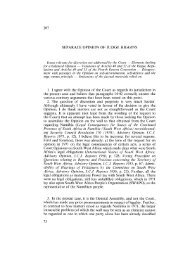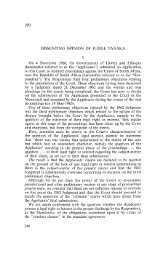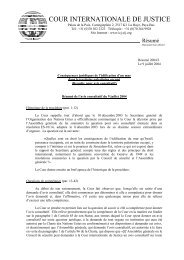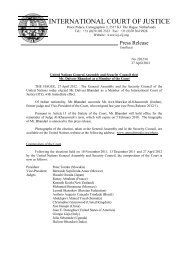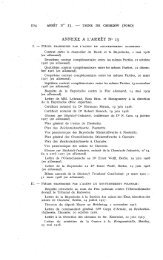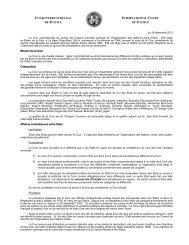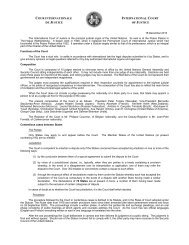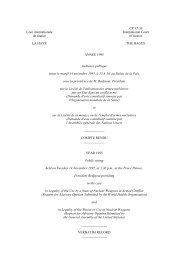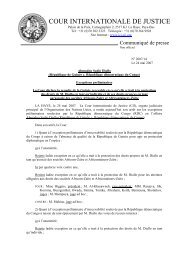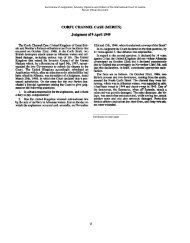botswana/namibia - Cour international de Justice
botswana/namibia - Cour international de Justice
botswana/namibia - Cour international de Justice
Create successful ePaper yourself
Turn your PDF publications into a flip-book with our unique Google optimized e-Paper software.
(i) The Namibian Argument<br />
718. In Chapter IV of the Namibian Memorial the claim to sovereignty in respect of<br />
Kasikili/Sedudu Island is justified (in the rubric) on the basis of 'acquiescence, acceptance and<br />
recognition'. The text appears to treat acquiescence as a separate basis of claim although the<br />
account of the law stresses that 'acquiescence is an essential element - some would say the<br />
essential element - in the acquisition of prescriptive title' (Namibian Memorial, p.101, para.<br />
251). The relevant part of the Namibian Submissions do not distinguish the two bases of<br />
claim. Thus the relevant request to the <strong>Cour</strong>t is as follows:<br />
"3. Namibia and its pre<strong>de</strong>cessors have occupied and used Kasikili Island and exercised<br />
sovereign jurisdiction over it, with the knowledge and acquiescence of Botswana and its<br />
pre<strong>de</strong>cessors since at least 1890.'<br />
719. The Namibian position relating to acquiescence emerges clearly from the following<br />
passages in the Namibian Memorial:<br />
"During the entire period from 1890 to 1966, when they were responsible for the<br />
administration of Bechuanaland, the British authorities, with full knowledge of the facts set<br />
forth in the two preceding sections concerning Namibian/Masubia occupation and use of<br />
Kasikili Island and German and South African exercise of sovereignty there, failed to protest,<br />
object or interfere in any way with the situation as it existed. As is shown in para. 258, infra,<br />
this unbroken record of silence and passivity contrasted markedly with British conduct in<br />
neighbouring areas where it was the colonial power. After Botswana became in<strong>de</strong>pen<strong>de</strong>nt,<br />
Botswana maintained its silence for almost two additional <strong>de</strong>ca<strong>de</strong>s." (Namibian Memorial,<br />
p.102, para. 255).<br />
720. Two cases, the Temple Case (Namibian Memorial, pp.1108-9, paras. 271, 173), and<br />
Minquiers and Ecrehos Case (Namibian Memorial, p.128, para. 311), are relied upon in the<br />
Namibian Memorial to support a principle that will not allow a State to escape the<br />
consequences of some previous statement or act. In the Temple Case the use of a map over a<br />
period of fifty years was the issue, and in the Minquiers and Ecrehos Case a clear statement as<br />
to title was contained in an official <strong>de</strong>spatch; and both were effected in the forum of active<br />
diplomacy and negotiations. These situations are in no way comparable to the alleged failure<br />
'to follow up on Eason's recommendation' or 'the promulgation of GSGS 3915' (the 1933<br />
British map) which used the cartographic <strong>de</strong>vice of <strong>de</strong>picting the boundary along the southern<br />
bank of the Chobe River.<br />
721. In the present Chapter the Government of Botswana will examine the merits of the<br />
Namibian argument thus formulated. It may be noted that the concepts of 'acceptance' and<br />
'recognition' referred to in the rubric to the relevant chapter are not given separate treatment<br />
by Namibia and therefore will be left on one si<strong>de</strong>.<br />
(ii) The Weaknesses of the Namibian Argument<br />
722. The Namibian argument based upon acquiescence contains a whole series of major<br />
flaws. The first, in logical sequence, is that it rests upon false premisses. For there to be a<br />
legally significant record of 'silence and passivity', the acquiescence must be in response to a<br />
situation which is legally prejudicial. The evi<strong>de</strong>nce available contradicts the Namibian<br />
premiss that the island was 'occupied' by the German authorities or their successors. In



